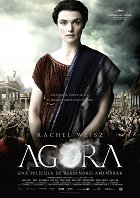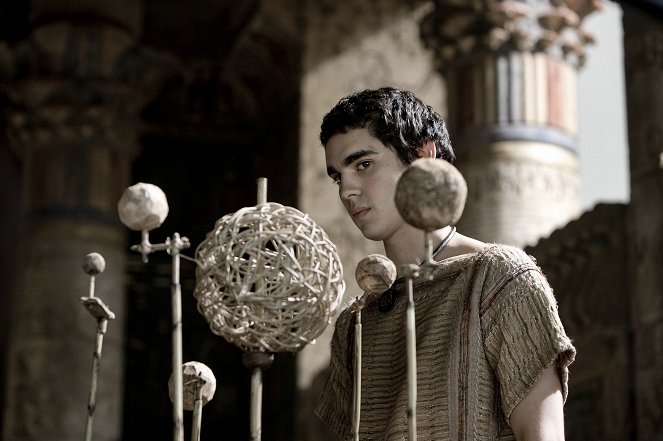Director:
Alejandro AmenábarCámara:
Xavi GiménezMúsica:
Dario MarianelliReparto:
Rachel Weisz, Max Minghella, Oscar Isaac, Ashraf Barhom, Michael Lonsdale, Rupert Evans, Homayoun Ershadi, Richard Durden, Yousef 'Joe' Sweid (más)Streaming (1)
Sinopsis(1)
Siglo IV. Egipto bajo el Imperio Romano. Las violentas revueltas religiosas en las calles de Alejandría alcanzan a su legendaria Biblioteca. Atrapada tras sus muros, la brillante astrónoma Hipatia lucha por salvar la sabiduría del Mundo Antiguo con la ayuda de sus discípulos. Entre ellos, los dos hombres que se disputan su corazón: Orestes y el joven esclavo Davo, que se debate entre el amor que le profesa en secreto y la libertad que podría alcanzar uniéndose al imparable ascenso de los cristianos. (20th Century Fox España)
(más)Reseñas (9)
I’m satisfied. From the smart, witty story and from Amenábar's directorial concept, which does not pander to the taste of the ordinary viewer. Plus, I have a soft spot for strong female characters, which Hypatia undoubtedly was; a wise woman, eager to learn and explore, a strong and independent person. I bet it was a pleasure for Rachel Weisz to play a role like that. The clever script outlines many interesting historical aspects: the twilight of the Roman Empire, religious obscurantism, the beginnings of blood feuds between the early Christians and Jews, and also interestingly outlines contemporary thinking about our solar system – the theory of Ptolemy and the heliocentric view held by Aristarchus. Amenábar has delivered a though-provoking historical movie here.
()
A beautiful historical film set in late antiquity Alexandria, featuring my beloved Rachel Weisz. The quality was a very pleasant surprise and the courage to show certain things full-on was also a shock. The world is still full of lunatics and if I were the godless Amenábar, I’d watch out very carefully for any stone flying in my direction.
()
The course of history sometimes takes sad directions, where in certain situations we have to wait 1,200 years to rediscover things. And yet, even after so many experiences, we are not able to think better of it and learn. This is a producer suicide and one mirror elegantly set to today’s Islam on how faith, so necessary for many, can easily be swept down a path of fanaticism that knows no bounds, nor respect.
()
When it comes to historical films of various genres, I usually prefer the most realistic and faithful portrayal of events. Agora does not adhere to a faithful depiction of the presented events, as it condenses and compresses complicated historical events in such a way that processes that lasted for centuries are narrated within a few years. The main protagonist is inevitably portrayed by a charming female star, while the characters are somewhat artificially polarized. And yet, I ultimately lean toward the highest rating because Amenábar directed a magnificent spectacle devoid of cheap action elements, yet one that is still visually appealing thanks to excellent direction, cinematography, and set design. The historical image of the last centuries of the Roman Empire has understandably been thoroughly distorted by the victorious side, namely the Christians. What prevails in history has the right to change the past. And so, the perception of individual figures in Roman politics has been distorted according to their relationship with the Christian religion. Monotheistic religions tend to spread their ideas by any means necessary - in this respect, Christianity did not differ much from Islam during its expansion. Roman emperors intervened against Christians not only because they questioned the divine status of the emperor but also because they needed to ensure peace in an empire where hundreds of cultures, languages, and religions collided, and the Christians systematically disrupted this peace during their propagation of the word of God. I only considered giving the film four stars, but when I watched a recent rerun of Cleopatra and felt how worn out it seems compared to Agora, I leaned toward five stars. Overall impression: 90%.
()
The story is almost timeless and definitely manages to captivate, the setting is grandiose, and the actors, led by the beautiful (Miss Teacher) Rachel Weisz and the fanatical Ashraf Barhom are very good. Amenábar is good at telling stories, and despite sometimes trying too hard to manipulate situations to reflect current problems, he navigates the story with a firm hand. I really appreciated that the sub-plot was devoted to exploring the universe (thanks to that we have breathtaking footage from space) and one of the most remarkable libraries of the ancient world.
()
On the one hand, I'm tired of a lot of movies taking place around the year 0, and Caesar or Jesus is at least mentioned everywhere. I was hoping for something completely different when they managed to make something set in 391 A.D., but in the end, it's just another old familiar clash on the theme of Quo Vadis - where do you go with Christianity now that religion is allowed? Unfortunately, the parallels with medieval obscurantism are many, and the story of Hypatia is as hopeless as Witchhammer. Maybe this is the way it was meant to be, but formally it's not that great, and aside from Rachel Weisz, there aren't any great actors to attract my empathy.
()
As two hours of history, it's okay, with solidly outlined battles both physically and spiritually. As a film, however, it fails. It's only bearable for two hours thanks to the lavish production design and solid philosophy, because it's hard to sympathise with the frigid Rachel Weisz on any level other than scientific, and the other characters are elusive. In addition, there are confusing fight scenes, inconsistent emotions, and an awkward outcome. Maybe, if they had thrown in some allegorical madness or a few sad looks, I would have thought it was directed by the chief philosopher Aronofsky.
()
...and since they didn't beat each other up back then, they're still fighting to this day. The only difference is that stones and sticks are no longer in use and have been replaced by much more "advanced" weapons. That’s too bad. My hat is off to both Amenábar the screenwriter and Amenábar the director, for he has managed to put together a film in which I have nothing to fault. There is no need to think long about the relevance of his idea, nor is it necessary to consider whether Rachel Weisz is better looking or better acting (it's a tie, of course), I fell in love with Marianelli's soundtrack a long time ago... But I was absolutely stunned by how good Agora looks. The director intersperses breathtaking aerial shots of a living Alexandria with stunning space views of Earth, perhaps to suggest that someone is watching the mayhem going on below... If that's the case, I wonder if that someone is grinning in amusement or shaking his head and wrinkling his forehead in despair.
()
"Agora" is a film that deceives us a little by its appearance. Alejandro Amenábar is a director from whom we expect great things. A bit of artistic films that will captivate you. "Agora" will not disappoint in this sense, because it deals with a subject matter that you won't easily see in a film. After all, there aren't that many historical films that don't revolve around heroic and beautiful characters. Moreover, when we realize that the main character is a philosopher, something will seem a bit suspicious to you. But that says a lot, it really is a philosophical film, as well as a film about philosophy. More: http://www.filmovy-denik.cz/2013/02/agora-2009-65.html
()

